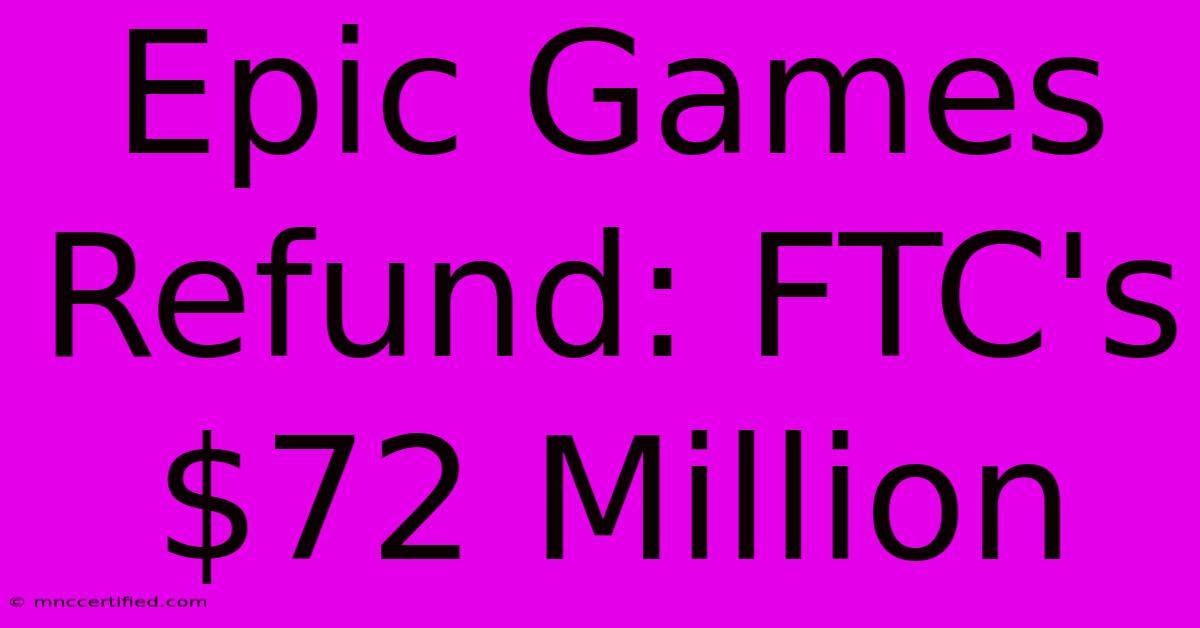Epic Games Refund: FTC's $72 Million

Table of Contents
Epic Games Refund: FTC's $72 Million Settlement – What You Need to Know
The Federal Trade Commission (FTC) recently announced a landmark $520 million settlement with Epic Games, resolving allegations of deceptive billing practices and unauthorized charges. This significant sum includes a $245 million refund to consumers, making it one of the largest video game-related settlements in history. Let's delve into the details of this case and what it means for gamers.
Understanding the FTC's Allegations Against Epic Games
The FTC's complaint centered around two key allegations:
-
Easy-to-miss default settings leading to unwanted charges: The FTC claimed that Epic Games' default settings made it too easy for players to unintentionally make in-app purchases, particularly on mobile devices. Children, in particular, were vulnerable to these unexpected charges. The "easy button" design, designed to encourage spending, was a primary point of contention.
-
Unauthorized charges and difficulties obtaining refunds: The commission further alleged that Epic Games made it unnecessarily difficult for consumers to obtain refunds for unintentional purchases. The refund process itself was reportedly opaque and cumbersome, leaving many frustrated and out of pocket.
The $520 Million Settlement: Breakdown and Impact
The settlement includes several key components:
-
$245 million refund to consumers: This significant sum will be distributed to millions of consumers who experienced unwanted charges through Epic Games' services. The exact amount each individual receives will depend on their specific circumstances and the nature of their unauthorized charges.
-
$275 million civil penalty: This penalty is intended to deter future deceptive practices and emphasizes the seriousness of the FTC's allegations.
How to Claim Your Refund
The process for claiming your refund will be announced by the FTC. Stay tuned to the FTC's official website and Epic Games' announcements for detailed instructions. Expect the process to involve verifying your purchases and providing identification. Be wary of scams pretending to offer assistance with the refund process.
Preventing Future Unintended Charges
While this settlement provides relief to affected consumers, it also serves as a cautionary tale. To prevent similar issues in the future, consider these tips:
-
Enable parental controls: If you're a parent, ensure robust parental controls are in place on all devices used by your children. These controls can restrict in-app purchases and prevent accidental spending.
-
Carefully review in-app purchase settings: Always carefully review the settings before downloading and using any app, especially those that offer in-app purchases. Understand the default settings and disable automatic renewals or one-click purchases if you're uncomfortable.
-
Regularly monitor your account statements: Regularly reviewing your credit card and bank statements will help you quickly identify any unauthorized charges.
Long-Term Implications of the Epic Games Settlement
This settlement sends a clear message to the gaming industry about the importance of transparent and consumer-friendly billing practices. It sets a precedent for future FTC enforcement actions against companies engaging in deceptive in-app purchasing practices. This outcome underscores the growing importance of consumer protection in the rapidly evolving digital marketplace. Expect greater scrutiny on similar business models going forward.
Keywords: Epic Games, FTC Settlement, $245 Million Refund, In-App Purchases, Unauthorized Charges, Deceptive Billing, Consumer Protection, Fortnite, Parental Controls, Refund Claim, Gaming Industry, FTC, Civil Penalty
This article uses a variety of headers, bold text, and keyword placement to optimize for search engines while maintaining readability. Remember to always double-check facts and figures with official sources before publishing.

Thank you for visiting our website wich cover about Epic Games Refund: FTC's $72 Million. We hope the information provided has been useful to you. Feel free to contact us if you have any questions or need further assistance. See you next time and dont miss to bookmark.
Featured Posts
-
Fiennes Comer Taylor Johnsons New Fight
Dec 10, 2024
-
Ralph Fiennes Fights Zombies New Trailer
Dec 10, 2024
-
Rooney Avoids I M A Celebrity Finale Why
Dec 10, 2024
-
Nj Lawmakers Probe Recent Drone Activity
Dec 10, 2024
-
I Player East Enders Character Returns
Dec 10, 2024